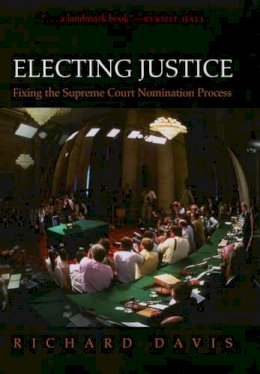

Stock image for illustration purposes only - book cover, edition or condition may vary.
Electing Justice: Fixing the Supreme Court Nomination Process
Richard Davis
€ 4.99
FREE Delivery in Ireland
Description for Electing Justice: Fixing the Supreme Court Nomination Process
Hardcover. Discusses the increasing role of interest groups, the press, and the public, whose role is not prescribed in the Constitution in the selection and confirmation of Supreme Court justices and how it affects the process. The author first examines the history and nature of the process, then he looks at the role and impact of other players. Num Pages: 224 pages, numerous tables. BIC Classification: 1KBB; JPHF; LNAA. Category: (P) Professional & Vocational. Dimension: 242 x 164 x 19. Weight in Grams: 442.
The nomination and confirmation of Supreme Court justices has, in recent years, become a battleground like no other. Bruising Senate confirmation hearings for failed nominee Robert Bork and successful nominee Clarence Thomas left the reputation of all branches of government in disarray and the participants--and the nation--exhausted. The Senate's Constitutional prerogative to provide advice and consent to the President's nominations to the highest court in the land has given rise to political grandstanding and ideological battles. Less well known is how other players--interest groups, the news media, and, through their involvement, the general public--also affect the conduct and outcome of the Supreme Court nomination process. Electing Justice reveals how from the late 1960s on, the role of these other players grew in intensity to the point that the nomination process would be unrecognizable to its original devisers, the Framers of the Constitution. Over the past quarter century, live television coverage of Senate hearings, "murder boards" in preparation for those hearings, a flood of press releases, television and radio advertisements, and public opinion polls all characterize nominations. Unlike earlier, more elite-governed processes, the involvement of outside groups has become highly public and their effect on the outcome of some nominations is now widely accepted. How should we respond to this informal democratization of the selection process? The genie, Davis contends, cannot be put back into the bottle and we cannot return to a non-political, elite-driven ideal. Davis concludes with several controversial recommendations that preserve the public role while avoiding the excesses of past controversial nominations. By embracing the public's new role in the examination of nominees we can ensure a democratic process and secure an independent and accountable judicial branch.
Product Details
Publisher
OUP USA
Number of pages
220
Format
Hardback
Publication date
2005
Condition
New
Number of Pages
224
Place of Publication
New York, United States
ISBN
9780195181098
SKU
KEX0227644
Shipping Time
Usually ships in 2 to 4 working days
Ref
99-3
About Richard Davis
Richard Davis is Professor of Political Science at Brigham Young University. He is the author of The Web of Politics: The Internet's Impact on the American Political System (Oxford, 1999), The Press and American Politics, 3rd edition (Prentice Hall, 1994), and Politics and the Media (Prentice Hall, 1994). He is co-author of New Media and American Politics (Oxford, 1998), with Diana Owen and Campaigning Online: The Internet in U.S. Elections, with Bruce Bimber.
Reviews for Electing Justice: Fixing the Supreme Court Nomination Process
Electing Justice offers a useful and accessible tour of the current confirmation process, ultimately leading to a series of recommendations to fix perceived problems.... Davis also includes the suggestion that Supreme Court justices be elected, which is sure to be controversial. This volume would be an ideal choice for an advanced undergraduate course on judicial politics and perhaps as a supplementary text for a seminar on presidential and/or legislative politics. Davis' book is a 'good read' and is thought-provoking, to say the least, and it merits the attention of anyone interested in the politics of staffing the bench.
Law and Politics Book Review
Analytic, well-researched and interesting historical review of the increasing recent role of the news media, public opinion and interest groups in the choice of U.S. Supreme Court Justices.
New York Law Journal
In an accessible book that should prove interesting to readers whether or not they are scholars, Davis traces major changes that have been made to the process of choosing justices.
Deseret Morning News
Richard Davis offers an insightful, provocative, and arresting view of the modern Supreme Court appointment process. It is, he demonstrates, more like an electoral campaign than the elite dominated and closed process developed by the Framers. The result is a landmark book about the modern process of finding high court judges.
Kermit Hall, President, University at Albany, SUNY
Law and Politics Book Review
Analytic, well-researched and interesting historical review of the increasing recent role of the news media, public opinion and interest groups in the choice of U.S. Supreme Court Justices.
New York Law Journal
In an accessible book that should prove interesting to readers whether or not they are scholars, Davis traces major changes that have been made to the process of choosing justices.
Deseret Morning News
Richard Davis offers an insightful, provocative, and arresting view of the modern Supreme Court appointment process. It is, he demonstrates, more like an electoral campaign than the elite dominated and closed process developed by the Framers. The result is a landmark book about the modern process of finding high court judges.
Kermit Hall, President, University at Albany, SUNY
